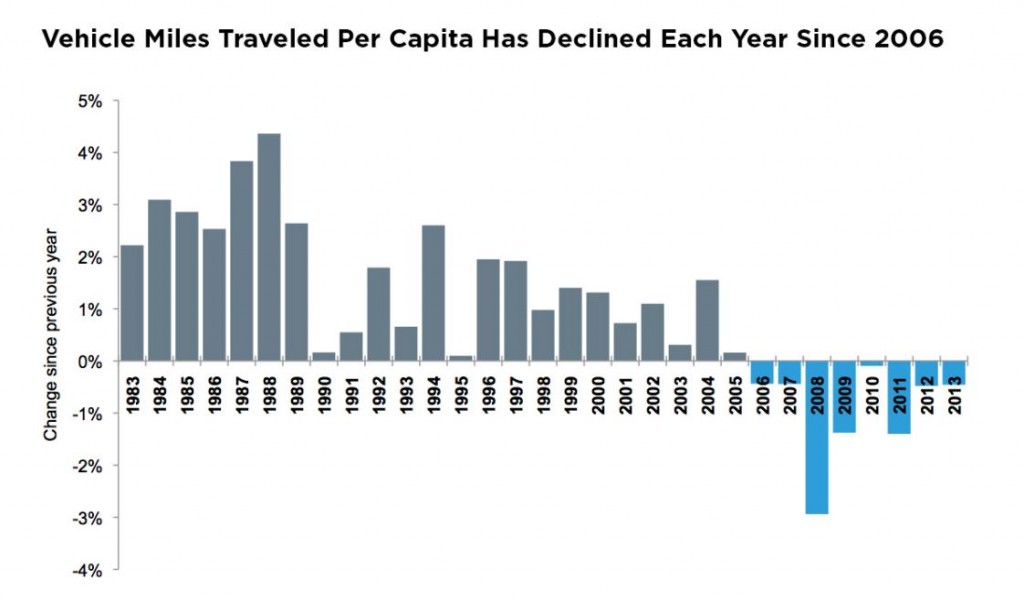The citations and graph in the following post come from “Beyond Traffic 2045, Trends and Choices” published by the U.S. Department of Transportation accessible here: http://www.dot.gov/sites/dot.gov/files/docs/Draft_Beyond_Traffic_Framework.pdf
 ”The travel behaviors of young adults matter. Today there are more Millennials than there are Baby Boomers. There are 74 million Americans aged 18 to 34, compared to 68 million Americans aged 50 to 68.” (Beyond Traffic, 17) By the mid-2000s vehicle miles traveled (VMT) per capita started to decline for the first time since the oil crises of the 1970s. There are various explanations for why this may be happening; however, there is not a consensus with respect to which factors have the strongest influence or whether these trends will continue. Some suspect that Millennials, who came of age using the internet, are more apt to substitute mobile technology and social media for social oriented travel that characterized previous generations of young people. Also it has been observed that Millennials have delayed getting driver’s licenses and starting families when compared to previous generations. However, it is still unclear whether Millennials are driving less as a matter of choice or out of economic necessity. And it is unclear how this trend will hold up when Millennials do start to have families in significant numbers. (Beyond Traffic, 15-18)
”The travel behaviors of young adults matter. Today there are more Millennials than there are Baby Boomers. There are 74 million Americans aged 18 to 34, compared to 68 million Americans aged 50 to 68.” (Beyond Traffic, 17) By the mid-2000s vehicle miles traveled (VMT) per capita started to decline for the first time since the oil crises of the 1970s. There are various explanations for why this may be happening; however, there is not a consensus with respect to which factors have the strongest influence or whether these trends will continue. Some suspect that Millennials, who came of age using the internet, are more apt to substitute mobile technology and social media for social oriented travel that characterized previous generations of young people. Also it has been observed that Millennials have delayed getting driver’s licenses and starting families when compared to previous generations. However, it is still unclear whether Millennials are driving less as a matter of choice or out of economic necessity. And it is unclear how this trend will hold up when Millennials do start to have families in significant numbers. (Beyond Traffic, 15-18)
It is clear that our next long-range transportation plan will need to anticipate the possibility that future VMT per Capita could indeed remain flat or even slightly decline over time as the tastes and preferences of future generations change. This effect could combine with technology changes, such as various levels of vehicle automation, to allow current infrastructure to successfully accommodate future travel demand to a greater extent than is currently anticipated. It may be difficult to quantitatively apply these trends to funding decisions in our next long-range transportation plan; however, project and policy decisions should at least consider the trends on a qualitative level.
What are your thoughts? Please use the comment boxes to provide feedback to the following questions:
- Do you think that Millennials will continue to drive less than previous generations as they age and have children?
- Do you think that technological advances, Intelligent Transportation Systems and some level of driver assist or vehicle automation, will allow current roads to accommodate much of the travel demand in 2040?
- Do you think that we will need new terrain roads and highways in the future to the extent that we have in the past?
